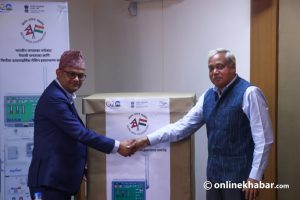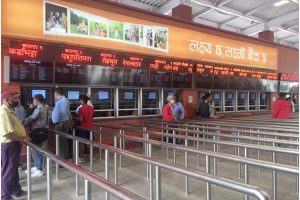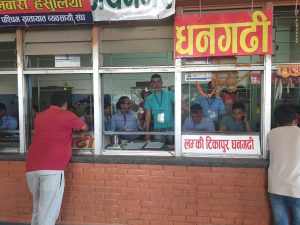 On a bright sunny day in Kathmandu earlier this week, only a few vehicles were plying due to the lockdown imposed to control the coronavirus outbreak in the country. On the road in front of the Durbar High School, Ranipokhari, a middle-aged man in a green t-shirt, half pants and slippers with an improvised mask was pushing a thelagada (cart). He was pouring with sweat and pushing, not any goods, but a woman on it.
On a bright sunny day in Kathmandu earlier this week, only a few vehicles were plying due to the lockdown imposed to control the coronavirus outbreak in the country. On the road in front of the Durbar High School, Ranipokhari, a middle-aged man in a green t-shirt, half pants and slippers with an improvised mask was pushing a thelagada (cart). He was pouring with sweat and pushing, not any goods, but a woman on it.
Hurriedly, we asked him where he was going. He replied that he was on his way to Bir Hospital for dialysis.
Strange—a person being taken to hospital on a cart! Questions started popping in our heads: Where did they come from? What must have happened to them? Why were they using a cart instead of calling an ambulance? What compelled them?
 He was already near the hospital, so there was no point helping him an ambulance for him. Instead, we followed him. After he admitted the woman for dialysis, we asked him where he was from and who the woman was, and more importantly, why he brought her on a cart and not an ambulance.
He was already near the hospital, so there was no point helping him an ambulance for him. Instead, we followed him. After he admitted the woman for dialysis, we asked him where he was from and who the woman was, and more importantly, why he brought her on a cart and not an ambulance.
He introduced himself as Dambar Bahadur Simkhada from Ganga Jamuna rural municipality of Dhading. And, the woman was his wife. After the lockdown started, with no transportation services and no money, he took it upon himself to bring his wife all the way from Samakhusi for her dialysis. “While the lockdown is in effect, that’s how we shall continue,” shared Simkhada.
***

My name is Dambar Bahadur Simkhada, from Ganga Jamuna rural municipality of Dhading, currently living in Samakhusi. My wife has been sick for the past eight years. Even after many tests and treatments, her illness was not diagnosed.
A year ago, the doctors confirmed it was the kidney problem and that she would require regular dialysis. Before the lockdown, we were getting free dialysis at a dialysis centre near Samakhusi. In the lockdown, they issued a notice that they would not be doing free dialysis.
I asked them why, but they asked me to go to the Health Ministry. I went there as well. I got to know that they shifted the services to public hospitals. However, my wife’s name was not on the list. I explained the situation, and, after much deliberation, an employee from the ministry listed her name for the Bir Hospital.
 But, it is not easy to bring a patient to Bir Hospital from Samakhusi. Taxis are expensive to travel. It was expensive even while we were getting treatment near Samakhusi. The bills were a headache even before as the dialysis needed to be done twice a week.
But, it is not easy to bring a patient to Bir Hospital from Samakhusi. Taxis are expensive to travel. It was expensive even while we were getting treatment near Samakhusi. The bills were a headache even before as the dialysis needed to be done twice a week.
The dialysis was free, but the medicines and other expenses were not; they equalled to Rs 5,000-7,000 every time. Taxi bills, hence, are just unbearable.
***
I was abroad for eight years. I only came to Nepal about a year ago. I have been unemployed for a year. All the money I earned has already finished in her treatment. I am managing by taking loans and buying the goods on credit. Now, after the lockdown’s beginning, the situation has become worse. It has become very hard to manage medicines and even food supplies.
The burden of expenses just completely stops any thought or work.

It had become almost impossible to reach the hospital during the lockdown. A neighbour suggested me buying a cart and using it to take my wife for treatment. It sounded reasonable, so, with loans, I bought the cart and am using it to bring her here [to the hospital]. After the purchase, I have not had to pay for a taxi. It has made things easy for me too.
Every morning, I go to buy vegetables and then sell them in the neighbourhood. It has helped me collect money for her medicines. The dialysis is being conducted smoothly here, there is no problem. The doctors are being helpful too.
 The dialysis takes some three to four hours. After that, I put her on the cart and take her home. It repeats for the next dialysis.
The dialysis takes some three to four hours. After that, I put her on the cart and take her home. It repeats for the next dialysis.
Doctors have suggested a transplant. But, my blood group did not match. So was with other family members. It seems like we will have to do dialysis for the rest of life. There were problems before the lockdown and now as well. But, nowadays, it is like we are used to the problems. It has become a part of everyday life.
























